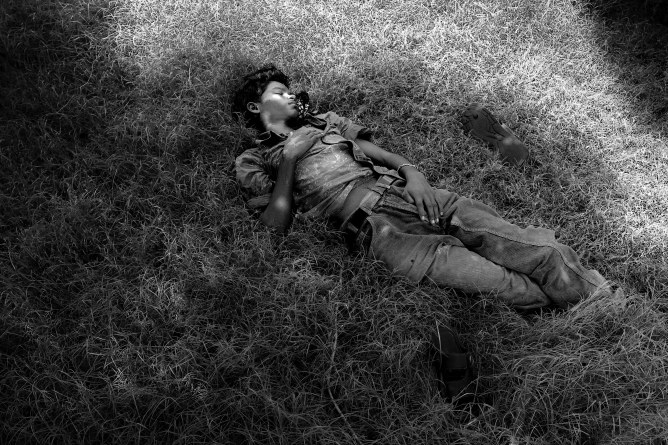Le Dormeur du Val – Arthur Rimbaud. Cahier De Douai, 1868 – 1870.
(English Translation provided below).

C’est un trou de verdure, où chante une riv
Accrochant follement aux herbes des haillons
D’argent; où le soleil, de la montagne fière,
Luit: c’est un petit val qui mousse de rayons.
Un soldat jeune, bouche ouverte, tête nue,
Et la nuque baignant dans le frais cresson bleu,
Dort; il est étendu dans l’herbe, sous la nue,
Pâle dans son lit vert où la lumière pleut.
Les pieds dans les glaïeuls, il dort. Souriant comme
Sourirait un enfant malade, il fait un somme:
Nature, berce-le chaudement: il a froid.
Les parfums ne font pas frissonner sa narine;
Il dort dans le soleil, la main sur sa poitrine,
Tranquille. Il a deux trous rouges au côté droit.
ENGLISH TRANSLATION
It’s a green hollow, where a river is singing
Crazily hanging on the grassy rags
Of silver; where the sun, from the proud mountain,
Is shinning: it’s a little valley bubbling with sunlight.
A young soldier, his mouth open, his head bare,
And the nape of his neck bathing in cool blue watercress,
Is sleeping; he is stretched out on the grass, under the skies,
Pale in his green bed where the light falls like rain.
Feet in the gladiolas (a flower), he is sleeping. Smiling like
A sick child would smile, he takes a nap:
Nature, cradle him warmly: he is cold.
Fragrances do not make his nostrils quiver;
He sleeps in the sun, hand on his chest,
Peacefully. He has two red holes in his right side.
What is the meaning of Le Dormeur Du Val by Arthur Rimbaud?
This poem plays tricks on you. The nature described at the beginning is very beautiful. Everything is peaceful and tranquil; and then we find out the young soldier is “cold”, “pale” and “quiver-less”. He’s dead. He has two bullet holes through his right side and is simply taking a figurative nap. Our poet, Rimbaud, does a good job at catching the reader off guard. Does the soldier’s death contribute to the scene of nature? Is the purpose of the poem to show that while life may end, nature continues?
The translation – although correct, is not as fun to read in English as it is in French.
To return to our French Literature Section, please click HERE.



Ce poeme est vraiment superbe!
Et je trouve ce blog très intéressant :). Merci!
beautiful (: